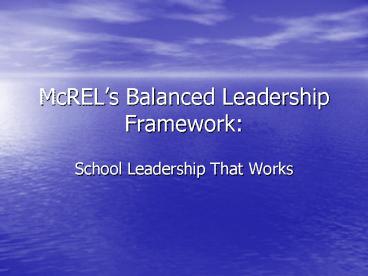McRELs Balanced Leadership Framework: - PowerPoint PPT Presentation
1 / 23
Title:
McRELs Balanced Leadership Framework:
Description:
Effective leaders influence individuals and organizations. ... There's nothing to hold on to.' Marilyn Ferguson. The Aquarian Conspiracy ... – PowerPoint PPT presentation
Number of Views:249
Avg rating:3.0/5.0
Title: McRELs Balanced Leadership Framework:
1
McRELs Balanced Leadership Framework
- School Leadership That Works
2
Operational Definitions
- Effective leaders influence individuals and
organizations. At the individual level, leaders
support learning that leads to individual and
organizational goals. At the organizational
level, leaders develop a shared vision and broad
goals. Leaders accept responsibility for
achieving results and create the necessary
environments that contribute to individual and
organizational success.
3
Operational Definitions
- Leadership is a shared responsibility for
achieving collective/organizational goals
regardless of positional or organizational
authority acknowledging that increasing levels
of positional authority yield greater impact in
an organization. Leadership is accomplishing
together what individuals cannot accomplish alone.
4
Operational Definitions
- Distributed leadership implies shared
responsibility and mutual accountability toward a
common goal or goals for the good of an
organization. Distributed leadership is not a
program or a model. It is a condition that
can be enabled and sustained through
organizational authority.
5
Rationale Why Distributed Leadership is Important
- Depending on the complexity of an organization
and the implications of the changes it is
attempting to implement, leadership demands more
than what one person can provide. Distributed
leadership is important because it creates
conditions for maximizing the collective
strengths of all individuals within a coherent,
adaptive, and sustainable organization as they
strive to adapt, learn, and grow. It requires
each person to assume responsibility and take
action for the good of the whole.
6
Methodology Used In McREL Study
- Meta- analysis of the quantitative research on
leadership practices associated with student
achievement - Review and synthesis of theoretical research
- Professional wisdom of 3 lead researchers based
on more than 100 years of experience
7
Background on McRELs Leadership Study
- 3,000 dissertation citations
- 2,000 other study citations
- 70 studies met their criteria for inclusion
- Quantitative data
- Achievement as the dependent variable
- Standardized scores
- Teacher perceptions
8
Benefits of Meta-Analysis
- The 70 studies included
- 2,894 schools,
- 1.1 million students, and
- 14,000 teachers.
- Initially 80 of those 70 studies found no
significant relationship to student achievement
9
Six Big Findings
- The effect size of general leadership
- Specific leadership responsibilities and
practices with statistically significant effects
on achievement - Strong leaders do not always have a positive
effect on achievement - Two major factors general leadership and change
leadership - Responsibilities with positive correlations to
leadership of 2nd order change - Responsibilities with negative correlations to
leadership of 2nd order change
10
Finding 1The average correlation between
principal leadership behavior and school
achievement is .25
- This means
- A one standard deviation increase in principal
leadership is associated with a 10 percentile
point gain in school achievement.
11
Finding 2
- The McREL research identified
- 21 leadership responsibilities and
- 66 leadership practices
- each of which has a statistically significant
relationship to student achievement.
12
Finding 3
- The Differential Impact of Leadership
- Leadership can have a positive or a negative
effect.
13
How do the Researchers Explain the Differential
Impact of Leadership?
- Or, what factors mediate leadership behavior?
- Focus of the change
- And
- Magnitude of the change
14
The Focus of Change
- Includes
- School factors,
- Teacher instructional factors, and
- Student factors
15
The Magnitude of Change
- Change can be
- 1st order change, or
- 2nd order change
- The difference is not a result of the size of the
change but rather the difficulty it presents to
the individual.
16
McRELs View of Change
- A change is defined by the implications it has
for the people expected to implement it or those
who will be impacted by it. - The same change can be perceived differently by
different stakeholders.
17
Characteristics of First Order Change
- Consistent with current values, beliefs, and
practices - Can be carried out with existing knowledge and
skills - Can be implemented by others, including outside
experts
18
Characteristics of Second Order Change
- A break with the past
- Conflicts with prevailing norms, beliefs, and
behaviors - Implemented by stakeholders
- Complex
- Requires new knowledge and skills
19
Finding 4Result of a Factor Analysis
- Two major factors
- General leadership
- Positive and negative correlations with 2nd order
change
20
Finding 5Positive Correlations with 2nd Order
Change (rank order)
- Knowledge of curriculum, instruction, and
assessment - Optimizer
- Intellectual stimulation
- Change agent
- Monitor and evaluate
- Flexibility
- Ideals and beliefs
21
Finding 6Negative Correlations with 2nd Order
Change (rank order)
- Culture
- Communication
- Order
- Input
22
The Art and Science of Leadership
- The art of progress is to preserve order amid
change and preserve change amid order. - Alfred North Whitehead
23
The Personal Impact of 2nd Order Change
- Its not so much that were afraid of change or
so in love with the old ways, but its that place
in between we fearits like being between
trapezes. Its Linus when his blanket is in the
dryer. Theres nothing to hold on to. - Marilyn Ferguson
- The Aquarian Conspiracy































